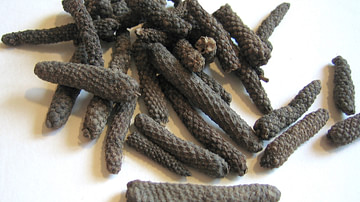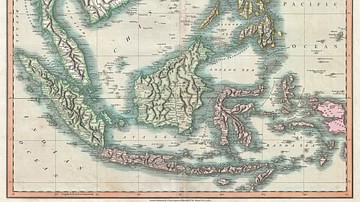Search
Did you mean: Tara?
Search Results

Definition
Thomas Cavendish
Thomas Cavendish (1560-1592 CE) was an Elizabethan mariner and privateer who famously circumnavigated the globe in 1586-88 CE, only the third voyage to do so and the first to set sail with that specific intention. Returning rich from Spanish...

Definition
William Dampier
William Dampier (1651-1715) was an English explorer, navigator, and naturalist, who was the first person to circumnavigate the world three times. He was also among the first Englishmen to step foot on Australian soil when he sailed into King...

Image
Ancient Indian Ship
This relief depicts an ancient Indian ship likely to have been used by Indian adventurers sailing to Java, Indonesia.
Location: Borobudur temple, Magelang, Central Java, Indonesia

Article
The Mongol Invasions of Japan, 1274 & 1281 CE
The Mongol invasions of Japan took place in 1274 and 1281 CE when Kublai Khan (r. 1260-1294 CE) sent two huge fleets from Korea and China. In both cases, the Japanese, and especially the samurai warriors, vigorously defended their shores...

Article
Cutty Sark - Fastest Ship in the World
With thousands of square feet of canvas capturing every breath of the trade winds, a 19th-century tea clipper was the absolute pinnacle of sailing evolution. The Cutty Sark was just such a ship, carrying tea and then wool across the far-flung...

Article
Francis Drake's Circumnavigation of the Globe
The English mariner, privateer, and explorer Francis Drake (c. 1540-1596 CE) made his circumnavigation of the world between 1577 and 1580 CE. Only the second to achieve this feat after the expedition of the Portuguese explorer Ferdinand Magellan...

Article
The Foundation of the Royal Society
The Royal Society was founded in 1662 to promote scientific research and increase our knowledge of the natural world. With royal patronage and a stellar membership of great minds, the society quickly gained international recognition for its...

Article
Middle Eastern Power Shifts & the Trade of Pepper from East to West
Pepper has long been the king of spices and for almost 2,000 years dominated world trade. Originating in India, it was known in Greece by the 4th century BCE and was an integral part of the Roman diet by 30 BCE. It remained a force in Europe...

Image
Prambanan
Prambanan (Javanese: Rara Jonggrang) is a Hindu temple dating from the 9th century CE located near Bokoharjo, on the island of Java in Indonesia. Prambanan is the largest Hindu temple in Indonesia and one of the largest Hindu temples in Southeast...

Image
Map of the East Indies and Southeast Asia
An 1801 map of the East Indies and Southeast Asia ( Singapore, Borneo, Sumatra, Java, Philippines).